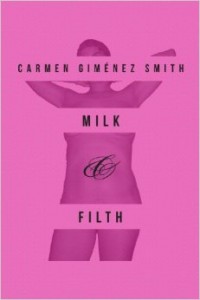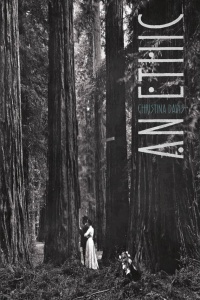Milk and Filth
 Milk and Filth
Milk and Filth
by Carmen Giménez Smith
The University of Arizona Press, October 2013
80 pages / $15.95 Buy from Amazon or The University of Arizona Press
The shinier the surfaces, the more the body leaves a smear on them, but contamination goes both ways. Increasingly, it’s what we feed on, even if it’s the parasite feasting on our dreams. It used to be that producer, distributor, and consumer were relatively separate entities, but the next economy wants them to be the same, as the object to be consumed becomes inseparable from its transmission, its dispersion, although what’s being sold and consumed are selves that the corporations are designing right next to the security apparatuses. “Your Data Is Political” is the title of a poem in Carmen Giménez Smith’s Milk and Filth describing the latest wave of colonization, which is related to what passes for culture these days—a user picking up someone else’s meme that the latter didn’t create while the whole process is datamined. But I like the accelerants—they make the fire go faster. And I’ll stick with poetry for now, because of any literary mode, its material components remain the most unruly, and the market still hasn’t figured out a way to capitalize on it, although just wait until they start charging for those MOOCs!
Poetry eludes efficiency, it shows choice to be fundamentally irrational, it embraces the misshapen, and so perhaps the most shocking line in Milk and Filth—a collection of poems aiming to transgress—is: “I write flabby poems, but fortunately my smart bombs cover them.” The problem with Conceptual poetics is that it’s too literal (or as Charles Bernstein says, “All poetry is conceptual but some is more conceptual than others.”), about a decade or two after the literal was transformed by the banality of the spectacle from discovery (“Q: And babies? A: And babies.”) to the dumb dumb club we’re all prodded to join. Perhaps poets should leave the documentaries to the historians and activists, which poetry can also be, but maybe if it’s not called art, which at least since Nirvana pop has relentlessly consumed. I’m willing to consider Lady Gaga an artist, but her music has never been anything but Top 40 fodder made by machines.
Elsewhere militarizing her metaphors, Giménez Smith understands the relationship between language and weaponry, the non-white body as an ongoing target as she seeks to “paint / more brown into the plot” and “wants mongrel dictions / to add to her arsenal.” But this intermixing is then intermixed with the deracination that occurs over generations as well as with the standardizing forms of expression and articulation, even when poetic: “the colonizing / worm is buried deep in you.” Indeed. Patriarchy is a motherfucker, and Milk and Filth veers more toward abjection than transgressiveness: “I’m debased but not that low,” she says, like William Pope.L sitting on a high toilet chewing the Wall Street Journal and washing it down with milk and ketchup, bio-economically redoubling the whiteness (and blood), or Cindy Sherman’s doll parts and viscera (an artist who along with the unfortunately overlooked Claude Cahun—the more radical version of Gertrude Stein—gets a nod in Giménez Smith’s endnotes to her poems). This (re-)claiming of the fragmented body turns inside out the totalizing gaze it has internalized; it floats to the surface the half-buried and the mostly unspoken, which are synonymous within regimes of the visible that change according to linguistic acts outside the normative, whether form or content, and usually the latter.
No wonder, then, that gender is treated as both fantasy and real. Milk and Filth opens with a series of poems entitled “Gender Fables” emphasizing the fabricated narratives that construct it, and one of these, “Susannah’s Nocturne,” might be read feminist after all the post(s)-:
looking for the other though
the other was Me. I free myself
through tree music, what some called
my morality-inflicted wound.
More to the story that I can’t get inside
or out of without rope. In both
the story and the trope, I am bride.
“I is another” is one of the oldest tricks in the book, but “the other was Me” illuminates the oppressive conventions women and women of color are still Subjected to on a daily basis, ideologically betrothed but remaining resistant. Milk and Filth is filled with references to enclosure and entrapment, including within an ocean stretching as far as the I can see. Feminist politics and poetry offer primary means of escape, although they, like everything else, are compromised, in the latter case by the degree of class privilege (the rope here and other places in the book) that surviving—i.e., making a living—from writing poetry (well, teaching, actually; and teaching it tenure-track, in fact) entails. For all of its general progressiveness, the poetry world doesn’t like explicitly political poetry, except within the spoken word community. While not overtly political, Milk and Filth triangulates ethnicity, gender, and class in ways both direct and nuanced that would seem to be the starting point for depicting social conditions in the early twenty-first-century United States, but mostly isn’t.
Midway through Milk and Filth, Giménez Smith inserts a complicated and sometimes contradictory “Parts of an Autobiography” written in 111 short prose sections, usually consisting of a sentence or two: “72. I’m the Shitty Friend writing valentines. I modify everything.” To say one thing and do another isn’t ideal, but to say one thing and desire something else is the political/discursive realm under which we are asked to live. In Milk and Filth, marriage, parenthood, politics, poetry, representations of the female body, etc., are riven with compromise, discomfort, even disgust, while simultaneously celebrated and embraced. (Giménez Smith’s 2010 “memoir” in fragments, Bring Down the Little Birds: On Mothering, Art, Work, and Everything Else, reads similarly.) One of the best poems in the book imagines an erotic encounter—a Blue Velvet-ish “place / of libidinous blackout”—separate from the cares and responsibilities of the everyday world with its mortgages and ceaseless office emails. Yet the very possibility of yet is the implicit yearning in this book, the sustaining metaphor of milk mingled with the non-figurative filth of how messy life really is.
***
Alan Gilbert is the author of two books of poetry, The Treatment of Monuments (Split Level Texts) and Late in the Antenna Fields (Futurepoem), as well as a collection of essays, articles, and reviews entitled Another Future: Poetry and Art in a Postmodern Twilight (Wesleyan University Press).
February 10th, 2014 / 10:00 am
An Ethic by Christina Davis
 An Ethic
An Ethic
by Christina Davis
Nightboat Books, March 2013
68 pages / $15.95 Buy from Nightboat Books or SPD
We live in an era of the performed self. Where ideology once hailed, Kim Kardashian now smiles. From reality TV to Facebook, from Snapchatting to every form of text- or image-based avatar, a sense of self—or, more precisely, senses of selves—depends on a technologically mediated audience for its/their existence. Yet the more this exhibitionism is transmitted via technology, the more it’s datamined, subjected to surveillance, snooped on—what’s at first innocently called “sharing.” This sharing is usually connected with something to sell, even if it’s a selling of self, while the civic modes of rhetoric are all shot through with profit. No wonder leisure time is in such short supply and represented by a sleep-deprived Miley Cyrus. But that’s because, ultimately, she doesn’t own anything, either.
The opening poem of Christina Davis’s An Ethic contains the apt observation, “only the long illusion we are landlord,” echoing a postcolonial ethics of learning to be a stranger in the place where you were born—non-nativist. When everything has been taken, and then taken away (Freud’s “fort/da” game without the “da”), it becomes the new categorical imperative of sorts to step out of this process. This isn’t a question of scarcity, because the world is already too much, which is why the mostly unconscious perceptual-ideological filters exist to keep it at bay. An Ethic speaks of an entirety, an enormity, and yet does so in a reticent language and sparse poems, as no matter how hard they try to enter this world fully, a shared world, a world shared before “sharing,” before you try to convince me that you have what I need, a nagging gnosticism haunts them. It’s the animals wearing crowns, but all crowns, as Sleigh Bells anthemically chant, get set on the ground.
I said to the man, “I do not know
if I am a good
or a bad.” He said, “To be a good person
you must first be a great animal.”
And so I let the crawl
come unto me.
This is when the body ceases to be a container, when the walls do fall, but only because of a proximity to death: the death of the/her father early in Davis’s book, the seeming destruction of everything when a home disappears, or bodies naked and craving a momentary extinguishing. An Ethic teeters on this abyss, with one foot pointed out of this world while the mother’s voice calls the subject back, or else it’s the words of surrogate fathers: Oppen, Eliot, Whitman, Seferis, Thoreau. In fact, I can’t remember a book of poetry filled with so many parental figures, as opposed to, say, the parents confessional poets like to complain about, which I think partially explains Davis’s reserve. “The father” only ever grudgingly gives permission to speak; “the mother” only ever provides an illusory shelter from the war, the war every father brings home from the war, the father as colony.
Yet the hesitancy in Davis’s language is also a precision in addressing the book’s fundamental concerns: not the outline of an ethic, but freedom and constraint, love (filial, erotic) and loss, the apparatus of power threaded through every aspect of life—down to the micro-bio—except for the thick grass that absorbs the corpse. It’s the wettest part of Davis’s at times eerily Dickinsonian poems that have clearly been chiseled, reworked, are almost flinty as a result of the time it takes to make them, a beautiful care and attention, which is an ethic of its own, the poem as impossible “grail- / stone,” because ethics are easy in space, and more difficult in time. Give me room, and I can be very good (which isn’t the same as well behaved); give me time, and I can be even better. But these days, everyone’s time is spent earning money just to pay the rent or buy a bigger flat screen TV. The entirety of Davis’s poem “Dissent” reads: “In the kingdom / of images, the blink // is the infidel—.” Post-Sphinx, Oedipus gouged out his eyes when he discovered that he had killed his father and slept with his mother. Those existing separate from the realm of myth only get to do one of those.
October 21st, 2013 / 11:00 am
